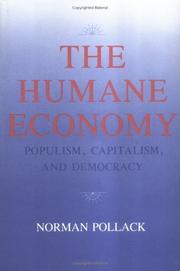| Listing 1 - 10 of 29 | << page >> |
Sort by
|
Book
ISBN: 3436016403 9783436016401 Year: 1973 Volume: 1324 Publisher: Frankfurt a. M.: Fischer,
Abstract | Keywords | Export | Availability | Bookmark
 Loading...
Loading...Choose an application
- Reference Manager
- EndNote
- RefWorks (Direct export to RefWorks)
Social policy --- Liberty --- Equality --- History --- Liberty - History --- Equality - History
Digital
Year: 1788 Publisher: London Printed for G.G. and J. Robinson
Abstract | Keywords | Export | Availability | Bookmark
 Loading...
Loading...Choose an application
- Reference Manager
- EndNote
- RefWorks (Direct export to RefWorks)
Book
ISBN: 0691635110 140085153X 9781400851539 9780691077796 0691077797 0691077797 9780691606354 0691606358 0691006113 9780691006116 9780691635118 Year: 1988 Publisher: Princeton, New Jersey : Princeton University Press,
Abstract | Keywords | Export | Availability | Bookmark
 Loading...
Loading...Choose an application
- Reference Manager
- EndNote
- RefWorks (Direct export to RefWorks)
Lienesch shows that what emerged from the period of change was an inconsistent combination of political theories. The mixture of classical republicanism and modern liberalism was institutionalized in the American Constitution and has continued--ambivalent, contradictory, and sometimes flatly paradoxical--to characterize American politics ever since.Originally published in 1988.The Princeton Legacy Library uses the latest print-on-demand technology to again make available previously out-of-print books from the distinguished backlist of Princeton University Press. These editions preserve the original texts of these important books while presenting them in durable paperback and hardcover editions. The goal of the Princeton Legacy Library is to vastly increase access to the rich scholarly heritage found in the thousands of books published by Princeton University Press since its founding in 1905.
Book
ISBN: 0814781918 0585330786 081478190X 0814784496 Year: 1990 Publisher: New York (N.Y.) : New York university press,
Abstract | Keywords | Export | Availability | Bookmark
 Loading...
Loading...Choose an application
- Reference Manager
- EndNote
- RefWorks (Direct export to RefWorks)
Cultural pluralism --- Democracy --- Free enterprise --- Liberty --- History. --- History --- Pluralism (Social sciences) --- Democracy - History. --- Free enterprise - History. --- Liberty - History. --- Pluralism (Social sciences) - History.
Book
ISBN: 0691077797 Year: 1988 Publisher: Princeton Princeton University Press
Abstract | Keywords | Export | Availability | Bookmark
 Loading...
Loading...Choose an application
- Reference Manager
- EndNote
- RefWorks (Direct export to RefWorks)
Liberty --- History --- 18th century --- Liberalism --- United States --- Constitutional history --- Liberty - History - 18th century. --- Liberalism - United States - History - 18th century. --- United States - Constitutional history.
Book
ISBN: 9004441697 9004441298 9789004441293 9789004441699 Year: 2020 Publisher: Leiden Boston
Abstract | Keywords | Export | Availability | Bookmark
 Loading...
Loading...Choose an application
- Reference Manager
- EndNote
- RefWorks (Direct export to RefWorks)
Libertas and Res Publica in the Roman Republic offers some essential ideas for an understanding of Roman politics during the Republican period by analysing two key concepts: libertas (liberty) and res publica (public matter, republic). Exploring these concepts through a variety of different aspects - legal, religious, literary, political, and cultural - this book aims to explain the profound relationship between the two. Through the examination of a rich array of sources ranging from classical authors to coins, from legal texts to works of art, Balmaceda and her co-authors propose new readings that elucidate the complex meanings and inter-related functions of libertas and res publica , in a thought-provoking, deep, but very readable study of Roman political culture and identity.
Liberty --- History. --- Liberty - History --- Republicanism - Rome - History --- Political science - Rome - History --- Rome - Politics and government - 265-30 B.C. --- Political science --- Republicanism --- Rome --- Politics and government --- History

ISBN: 0813515998 Year: 1990 Publisher: New Brunswick London Rutgers University Press
Abstract | Keywords | Export | Availability | Bookmark
 Loading...
Loading...Choose an application
- Reference Manager
- EndNote
- RefWorks (Direct export to RefWorks)
Book
ISBN: 2213019436 9782213019437 Year: 1987 Volume: vol *3 Publisher: Paris: Fayard,
Abstract | Keywords | Export | Availability | Bookmark
 Loading...
Loading...Choose an application
- Reference Manager
- EndNote
- RefWorks (Direct export to RefWorks)
La liberté est-elle la première des "idées-forces" dans la civilisation judéo-chrétienne ? C'est le point de vue de Pierre Chaunu dont la réflexion dans cet essai est aussi théologique qu'historique. Le concept de liberté est pour lui inscrit dans les premiers mots de la Genèse : "Au commencement Dieu créa". Cette conception repose sur trois principes : Dieu est liberté - la Création est issue d'un acte libre de Dieu que ne limite aucune nécessité - Dieu s'adresse à l'homme comme à l'alter ego de sa propre liberté. Cette "liberté au ciel", Pierre Chaunu s'en fait l'exégète à la lecture de la Bible et de ses principaux commentaires : ceux de Luther et de Calvin, d'Erasme -, comme ceux de saint Augustin et de Thomas d'Aquin. Mais la liberté, "cette notion immémoriale antérieure au mot qui la défend", a aussi une histoire. Elle commence avec le Ramapithécien qui se dresse sur ses pattes de derrière, elle est celle de la taille de l'outil, elle est acte créateur dans le temps vrai d'une vie sous le regard de la mort. Pierre Chaunu la replace au coeur des sociétés qu'il traverse avec érudition et passion : la Cité grecque, les guerriers du Moyen Age, les paysans parcellaires des XIIe et XIIIe siècles, ces "dix millions de décideurs tard mariés mais pour la vie", les persécutions religieuses à contre-courant du siècle de Louis XIV, la Révolution française qui a basculé sur la question religieuse et a sombré dans l'intolérance de 91 et la Terreur de 93 parce que "la valeur première de la Révolution est Egalité, dût-elle en coûter beaucoup en matière de libertés", le XIXe siècle des Libéraux pour qui la liberté est une valeur judéo-chrétienne de progrès. C'est en historien de la longue durée et de la continuité que Pierre Chaunu nous propose, avec la fougue qu'on lui connaît, cet itinéraire de la liberté "au ciel et sur la terre", "idée-force" dont il discerne les signes du retour dans la pensée d'aujourd'hui.
Liberty - History --- Liberté. --- Liberty --- Liberté --- History --- Histoire --- #SBIB:321H30 --- 130.15 --- 130.15 Vrijheid antropologisch --- Vrijheid antropologisch --- Hedendaagse politieke en sociale theorieën (vanaf de 19de eeuw): algemeen (incl. utilitarisme, burgerschap) --- Political philosophy. Social philosophy --- Liberté [Psychologie] --- Vrijheid [Psychologie].

ISBN: 0804724741 9780804724746 Year: 1995 Volume: *2 Publisher: Stanford (Calif.): Stanford university press,
Abstract | Keywords | Export | Availability | Bookmark
 Loading...
Loading...Choose an application
- Reference Manager
- EndNote
- RefWorks (Direct export to RefWorks)
Liberty --- Liberté --- History. --- Histoire --- Europe --- Politics and government --- Politique et gouvernement --- History --- -Civil liberty --- Emancipation --- Freedom --- Liberation --- Personal liberty --- Democracy --- Natural law --- Political science --- Equality --- Libertarianism --- Social control --- -History --- Liberté --- Liberty - History
Book
ISBN: 0889463123 9780889463127 Year: 1990 Volume: 9 Publisher: Lewiston (N.Y.): Mellen,
Abstract | Keywords | Export | Availability | Bookmark
 Loading...
Loading...Choose an application
- Reference Manager
- EndNote
- RefWorks (Direct export to RefWorks)
Liberty --- History. --- -Civil liberty --- Emancipation --- Freedom --- Liberation --- Personal liberty --- Democracy --- Natural law --- Political science --- Equality --- Libertarianism --- Social control --- History --- Plotinus --- Boluoding --- Iflūṭīn --- Plotin --- Plotino --- Plōtinos --- Plotinus, --- Plotyn --- Πλωτι̂νος --- פלוטינוס --- أفلوطين --- -History --- Plotinos --- Plotinus. --- Liberty - History.
| Listing 1 - 10 of 29 | << page >> |
Sort by
|

 Search
Search Feedback
Feedback About UniCat
About UniCat  Help
Help News
News